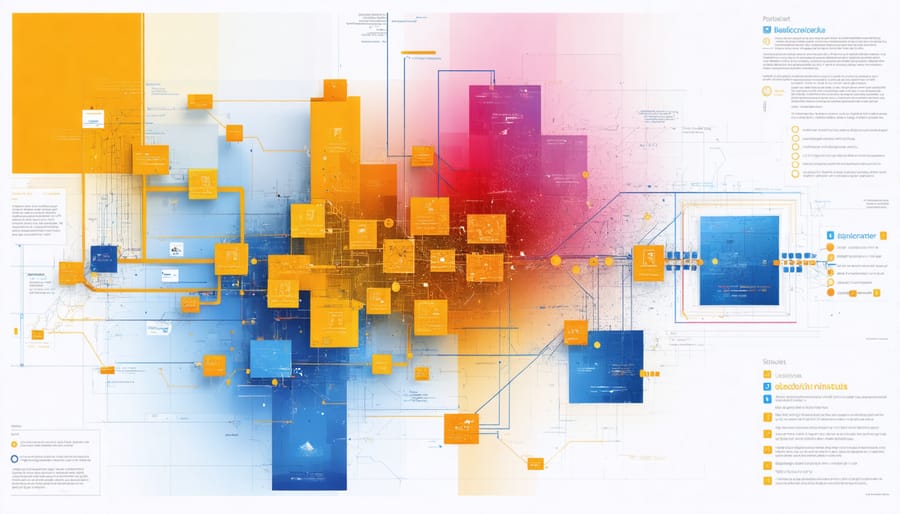In the race to secure and streamline construction data management, blockchain technology in construction has emerged as a transformative solution for storing and protecting critical project information. This distributed ledger technology addresses the industry’s longstanding challenges of data fragmentation, security vulnerabilities, and trust issues across multiple stakeholders.
Unlike traditional centralized storage systems, blockchain’s immutable and transparent nature ensures that every piece of project data—from material specifications to compliance documentation—remains tamper-proof and instantly verifiable. The technology’s decentralized architecture eliminates single points of failure while enabling real-time collaboration among architects, contractors, suppliers, and regulators.
For construction professionals seeking robust data management solutions, blockchain offers unmatched benefits: automated smart contracts that streamline procurement processes, permanent audit trails for regulatory compliance, and secure sharing of sensitive project information across organizational boundaries. As the industry continues its digital transformation, blockchain-based storage systems are becoming essential infrastructure for modern construction enterprises committed to data integrity and operational efficiency.
The Current Crisis in Construction Data Management
Data Fragmentation and Accessibility Issues
In the construction industry, data fragmentation remains a persistent challenge, with critical project information often scattered across multiple systems, departments, and stakeholders. Traditional data storage methods create information silos, where valuable data becomes trapped within specific teams or software platforms, limiting collaboration and decision-making effectiveness.
Project stakeholders frequently encounter difficulties accessing necessary documentation, specifications, and project updates in real-time. This fragmentation leads to version control issues, communication breakdowns, and potential delays in project execution. For instance, when architects modify design elements, contractors may continue working with outdated specifications if the changes aren’t immediately accessible across all platforms.
The problem compounds when considering the various software solutions used throughout the construction lifecycle – from design tools and project management systems to financial software and compliance tracking platforms. Each system typically maintains its own data repository, creating redundancies and inconsistencies that can impact project outcomes.
This fragmented approach also raises concerns about data security and audit trails, as tracking changes and maintaining accountability becomes increasingly complex across disconnected systems. The need for a unified, accessible data management solution has become critical for modern construction projects.

Security and Compliance Concerns
While blockchain technology offers robust security features, construction firms must address several digital security challenges when implementing blockchain-based storage solutions. Smart contract vulnerabilities can expose sensitive project data to unauthorized access, requiring regular security audits and updates. Additionally, firms must ensure compliance with data protection regulations such as GDPR and industry-specific requirements.
Key security considerations include access control mechanisms, encryption protocols, and node security in distributed networks. Construction companies must implement strict identity verification systems and maintain detailed audit trails of all data transactions. The immutable nature of blockchain, while beneficial for data integrity, poses challenges when addressing regulatory requirements for data modification or deletion.
Compliance frameworks vary by jurisdiction and project type, necessitating careful consideration of data storage locations and transfer protocols. Organizations must develop comprehensive security policies that address both technical vulnerabilities and regulatory obligations while maintaining operational efficiency. Regular staff training and updated security protocols are essential to maintain the integrity of blockchain-based storage systems.
Blockchain Storage Architecture for Construction

Distributed Ledger Technology Integration
Distributed Ledger Technology (DLT) in construction data storage operates through a network of interconnected nodes that collectively maintain and validate project information. Each node in the network stores an identical copy of the ledger, creating a robust system of data redundancy and verification. When new construction data is added, such as material specifications, inspection reports, or design modifications, it’s packaged into a block with a unique cryptographic signature.
The validation process involves consensus mechanisms where network participants verify the authenticity of new data entries. In construction applications, this typically utilizes either Proof of Authority (PoA) or Practical Byzantine Fault Tolerance (PBFT) protocols, which are more suitable for enterprise environments than traditional Proof of Work systems.
Smart contracts play a crucial role in data validation by automating the verification of predetermined conditions. For instance, when submitting as-built documentation, smart contracts can automatically check if all required fields are completed and if the submission meets project specifications before adding it to the ledger.
The immutable nature of blockchain ensures that once construction data is recorded, it cannot be altered without leaving a clear audit trail. This feature is particularly valuable for maintaining the integrity of critical project documentation, such as structural calculations, safety certifications, and regulatory compliance records.
To optimize storage efficiency, many construction-focused blockchain implementations use off-chain storage solutions for large files, while maintaining hash references on the blockchain. This hybrid approach allows for scalable data management while preserving the security and traceability benefits of blockchain technology.
Smart Contracts for Data Access Control
Smart contracts serve as automated gatekeepers in blockchain-based data storage systems, enforcing precise access control rules without human intervention. In construction projects, these self-executing protocols manage permissions for various stakeholders, from contractors and suppliers to project managers and regulatory bodies.
The implementation typically involves role-based access control (RBAC) mechanisms, where smart contracts automatically verify user credentials and permissions before granting access to specific data sets. For instance, a subcontractor might only access documentation relevant to their scope of work, while project managers maintain comprehensive access across all project data.
These contracts can be programmed to include time-based restrictions, ensuring that access permissions align with project phases and contractual agreements. When a contractor’s involvement in a project concludes, the smart contract automatically revokes their access privileges, maintaining data security throughout the project lifecycle.
Advanced features include audit trail generation, recording every access request and data modification in an immutable ledger. This transparency proves invaluable during disputes or compliance audits, as it provides undeniable evidence of who accessed what information and when.
Construction firms can also implement conditional access rules through smart contracts. For example, access to sensitive design documents might require multi-party authorization, or certain data sets might only become available after specific project milestones are achieved and verified on the blockchain.
The integration of smart contracts significantly reduces administrative overhead while enhancing security protocols. By automating access management, construction teams can focus on project execution rather than manual permission management, leading to improved efficiency and reduced risk of unauthorized data access.
Real-World Applications and Benefits
Project Documentation and Version Control
In the ever-evolving construction landscape, managing project documentation effectively has become crucial for successful project delivery. Blockchain technology offers a revolutionary approach to storing and tracking changes in blueprints, permits, and other vital project documents. Through practical blockchain applications, construction teams can maintain an immutable record of all document versions and modifications.
Each time a blueprint is updated or a permit is modified, the change is recorded as a new block in the chain, creating a transparent and traceable history of all documentation updates. This system ensures that all stakeholders have access to the most current versions while maintaining a complete audit trail of previous iterations. The decentralized nature of blockchain prevents unauthorized modifications and reduces the risk of document tampering.
Smart contracts can be implemented to automate the approval process for documentation changes, ensuring that all required stakeholders review and sign off on modifications before they’re permanently recorded. This streamlined approach significantly reduces administrative overhead and minimizes the risk of working with outdated documents.
For regulatory compliance, blockchain’s timestamped records provide irrefutable evidence of when changes were made and by whom. This feature is particularly valuable during inspections and audits, where demonstrating proper documentation management is essential for project success.

Supply Chain Data Integrity
In construction projects, maintaining supply chain data integrity is crucial for ensuring material quality, compliance, and project success. Blockchain technology offers an immutable solution for tracking materials from source to site, creating a transparent and verifiable record of procurement activities.
Each material shipment receives a unique digital signature on the blockchain, containing critical information such as origin, specifications, quality certifications, and handling requirements. This creates an unalterable chain of custody that validates material authenticity and helps prevent counterfeit products from entering the supply chain.
Project managers can instantly verify material specifications and certifications through the blockchain, eliminating the need for time-consuming document validation processes. When materials arrive on-site, their digital signatures are automatically cross-referenced with procurement records, ensuring delivered items match original orders.
Case studies have shown that blockchain-based supply chain tracking can reduce material verification times by up to 90% while significantly decreasing documentation errors. For example, a major commercial development in Singapore implemented blockchain tracking for structural steel components, resulting in complete traceability and a 30% reduction in procurement-related delays.
The system also maintains comprehensive audit trails for regulatory compliance and quality assurance. Suppliers, contractors, and project owners can access real-time updates on material status, creating unprecedented transparency in the construction supply chain. This visibility helps identify potential delays or quality issues before they impact project timelines.
Regulatory Compliance and Auditing
Blockchain technology offers significant advantages in meeting regulatory compliance requirements within the construction industry. The immutable nature of blockchain records ensures that all data modifications, access attempts, and transactions are permanently logged and easily traceable, satisfying strict regulatory documentation requirements.
For construction firms handling sensitive project data, blockchain provides automated compliance through smart contracts that enforce predetermined rules and permissions. These smart contracts can be programmed to align with various regulatory frameworks, including GDPR, HIPAA, and industry-specific construction standards.
During audits, blockchain’s distributed ledger technology streamlines the verification process by providing auditors with a complete, chronological record of all data transactions. This eliminates the need for time-consuming manual documentation reviews and reduces the risk of compliance violations.
A notable example is the implementation by Turner Construction, where blockchain-based data storage reduced audit preparation time by 60% while ensuring complete regulatory compliance across multiple jurisdictions. The system automatically generates compliance reports and maintains an unalterable audit trail of all document modifications.
The technology also supports cross-border compliance by maintaining consistent data handling protocols across different regulatory environments. This is particularly valuable for international construction projects where multiple regulatory frameworks must be satisfied simultaneously. By embedding compliance requirements directly into the blockchain infrastructure, organizations can achieve continuous regulatory adherence while minimizing administrative overhead.
Implementation Challenges and Solutions
Technical Infrastructure Requirements
Implementing blockchain for construction data storage requires robust technical infrastructure to ensure seamless operation and data security. At the hardware level, organizations need high-performance servers with significant processing power and storage capacity. These servers should be equipped with multi-core processors and a minimum of 16GB RAM to handle complex cryptographic operations effectively. As part of the broader digital transformation in construction, storage requirements typically start at 1TB and scale based on project size and complexity.
On the software side, organizations must deploy blockchain platforms such as Hyperledger Fabric or Ethereum Enterprise, complemented by smart contract development frameworks. Additional requirements include distributed database systems, API integration tools, and robust security protocols. Network infrastructure must support high-bandwidth connections with minimal latency, typically requiring dedicated fiber-optic lines with redundant backup systems.
Essential security components include hardware security modules (HSMs) for key management, firewalls configured for blockchain protocols, and encryption tools for data-at-rest and in-transit protection. Regular system maintenance and updates are crucial for maintaining optimal performance and security standards.
Training and Change Management
Implementing blockchain technology for data storage requires a comprehensive training and change management strategy. Construction organizations must focus on developing both technical competencies and organizational readiness. Key personnel, including project managers, site supervisors, and data administrators, need thorough training in blockchain fundamentals, data entry protocols, and security practices.
Organizations should establish a phased training approach, beginning with blockchain awareness sessions for all stakeholders. This is followed by role-specific technical training for team members directly involved in data management. Advanced training should cover smart contract operations, verification processes, and troubleshooting procedures.
Change management initiatives must address potential resistance by demonstrating clear benefits and ROI. Regular workshops and hands-on sessions help teams understand how blockchain improves data integrity, reduces disputes, and streamlines documentation processes. Creating internal champions who can support their colleagues during the transition is crucial.
Documentation and standard operating procedures should be developed and regularly updated. Organizations should also implement feedback mechanisms to identify training gaps and adjust programs accordingly. Continuous support through help desks and regular refresher courses ensures sustained adoption and optimal utilization of blockchain-based systems.
Blockchain technology is revolutionizing construction data management by providing unprecedented levels of security, transparency, and efficiency. By implementing blockchain-based storage solutions, construction firms can significantly reduce data disputes, streamline collaboration, and maintain immutable project records. The decentralized nature of blockchain ensures that critical project information remains accessible yet secure, while smart contracts automate and enforce data governance protocols. As the construction industry continues to digitize, blockchain storage will play an increasingly vital role in protecting intellectual property, maintaining regulatory compliance, and facilitating seamless information exchange between stakeholders. With demonstrated success in improving project outcomes and reducing risks, blockchain storage is not just a technological innovation but a fundamental shift in how construction data is managed, shared, and secured for the future.

